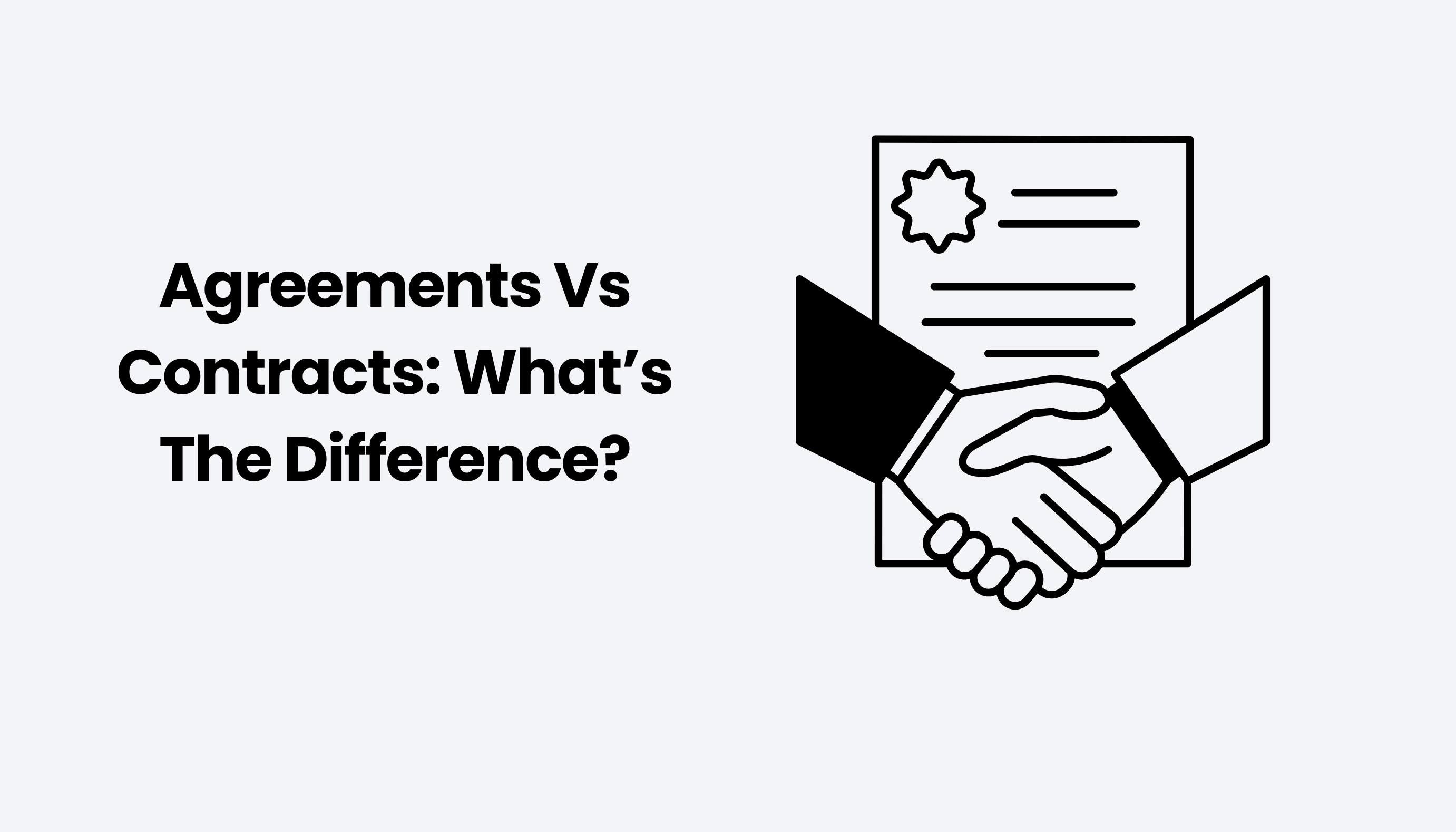Agreements Vs Contracts: What’s The Difference?

Agreements and contracts are two terms often used interchangeably, but they have distinct characteristics.
Both documents share the fundamental purpose of outlining a mutual obligation between parties but differ in their legal implications and formalities. A contract is a type of agreement, but not all agreements rise to the level of legal enforcement as a contract.
Here are some key differences between agreements and contracts to help you determine which option is more appropriate for your business needs in a particular situation.
Table of Contents:
- What is a Contract?
- What is an Agreement?
- Why Differentiate Between Agreements and Contracts?
- Agreements vs Contracts: Key Differences
- When To Use an Agreement vs. Contract?
- How To Turn an Agreement Into a Contract?
- Conclusion
Jump to a section that interests you, or keep reading.
What is a Contract?

A contract is a legally binding agreement between two or more parties that creates mutual obligations enforceable by law.
A contract must include six key elements to be considered valid:
- Offer: A clear proposal by one party to another that outlines specific terms and conditions
- Acceptance: An agreement to the offer's terms
- Awareness: Understanding of the terms and conditions
- Consideration: Anything of value exchanged between the parties, such as goods, services, or promises to act (or refrain from acting) in a certain way
- Capacity: The legal capacity of all parties involved to authorize a deal
- Legality: The purpose of the contract must be lawful because a contract cannot be formed to carry out an illegal act
Understanding these elements clearly is important, as they form the foundation of a legally enforceable contract.
What is an Agreement?

An agreement is an arrangement or a mutual understanding between two or more parties. It signifies that everyone involved is on the same page about a specific matter or intended course of action. It can be written or spoken, formal or informal.
Unlike contracts, agreements are not always legally binding.
In fact, they exist on a spectrum of formality.
Informal agreements outlining a simple understanding are often verbal or based on a handshake. This could be like agreeing to schedule a demo for a new tool.
While not always enforceable in court, informal agreements are still important for building trust.
On the other hand, formal agreements are usually written documents that specify terms and conditions of the understanding. They often serve a range of purposes beyond just guaranteeing legal enforceability.
Why Differentiate Between Agreements and Contracts?
- Enforceability: The key distinction between contracts and agreements lies in enforceability. Contracts are legally binding. If one party breaks the terms of the contract, the other party can seek legal action for damages. Agreements (especially informal ones) are harder to enforce in court. This leaves the parties vulnerable if the other one fails to follow through.
- Risk management: Businesses collaborate with other businesses and contracts regularly. Not understanding the difference between the two can lead to financial losses, legal disputes, and damaged relationships. Clarifying whether a collaboration requires a formal contract or a simple agreement helps ensure that both parties' interests are protected and expectations are clear.
- Clarity and Legal Protection: Putting agreements in writing, even if they are not full-fledged contracts, adds a layer of clarity between all parties involved. It reduces misunderstandings about the terms of the collaboration and expectations, ensuring that everyone is on the same page and minimizing potential conflicts. When a formal contract is necessary, having the right document in place ensures maximum protection for both parties under the law.
Agreements vs Contracts: Key Differences
| Aspect | Agreement | Contract |
|---|---|---|
| Definition | A mutual understanding between two or more parties | A legally binding agreement between two or more parties |
| Legality | Not always enforceable by law | Enforceable by law |
| Formal Requirements | Can be informal or verbal | Requires specific formalities, often in writing |
| Risk Exposure | Suitable for low-risk or trust-based relationships | Essential for high-risk or financially significant deals |
| Application | In the initial stages of negotiations, or when trust is established | For complex transactions, high-value deals |
When To Use an Agreement vs. Contract?
Agreements are best for:
- Low-risk scenarios: In situations when the stakes are relatively low, and you are dealing with matters that are unlikely to result in serious disputes.
- Relationships based on trust: When you have a strong foundation of trust and an established relationship with the other party.
- Initial stages of negotiation: Agreements are useful for outlining preliminary terms and intentions before drafting a formal contract.
Contracts are appropriate for:
- Situations involving significant finances: A contract provides clarity and legal recourse whenever substantial financial sums are involved.
- Complex deals: Contracts help define specific terms and obligations within multi-step arrangements or complex transactions.
- Legal protection: A contract is important when you need the assurance of legal enforceability if a dispute or breach occurs.
How To Turn an Agreement Into a Contract?
Sometimes, an agreement can evolve into a situation where the legal protection of a formal contract is needed.
To make this transition, you must make sure that all the important elements of a contract are present and clearly documented.
The offer's terms are specific, and the acceptance is unequivocal.
Clearly outline what each party is bringing to the table (goods, services, money, etc.) as a consideration for their participation in the contract.
All parties involved should have the legal capacity to enter into a contract.
The purpose of the agreement should be lawful.
It's always best to get your legal department involved in complex situations or when dealing with high-value transactions. Your legal team can draft a contract that complies with relevant laws, accurately reflects your agreement, and protects your interests.
Conclusion
Knowing the difference between agreements and contracts will help you ensure that when you enter into any business arrangement, you are fully aware of your rights, obligations, and the potential consequences. This knowledge will protect you from unintended liabilities, misunderstandings, and legal disputes to make informed decisions that safeguard your interests.
